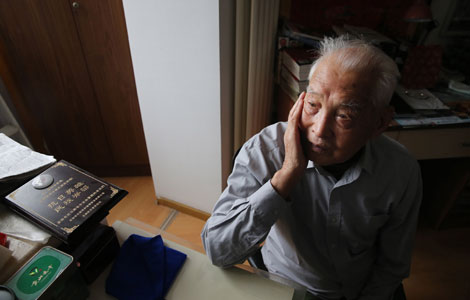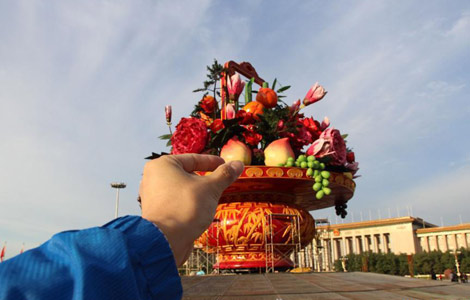Shanghai pioneers new form of liberalization
Updated: 2013-09-23 06:53
By Luo Jiexin and Xue He (China Daily)
|
|||||||||||
During his landmark southern tour in 1992, Deng Xiaoping, lauded as the architect of China's reform and opening-up, admitted he had made an unwise decision in not making Shanghai one of the first special economic zones during the early 1980s.
Because of this, Shanghai, as well as the neighboring Yangtze River Delta, missed an opportunity to lead the country's economic evolution.
However, in the 16 years since Deng passed away, the city appears to have the chance of pioneering China's next phase of opening-up and reform.
Recently, the State Council, the country's cabinet, approved the establishment of the Shanghai Free Trade Area, where several laws regulating foreign investment and trade would not be applied.
The Shanghai FTA, brainchild of Premier Li Keqiang, will eventually become a place where foreign trade, investment and capital can freely flow in and out.
Clearly, Li wants the FTA to be an "experimental field" for the country's economic future, just as Shenzhen was in the 1980s.
China joining the World Trade Organization in 2001 remained the last major breakthrough in the country's opening-up. Since then, its foreign trade systems have been overhauled fundamentally. It increasingly embraced open and free trade to help it become the world's largest trader and exporter, with foreign trade at one point accounting for more than a third of its GDP.
But reforms to foreign investment and financial systems failed to advance as much, as authorities held on to managing, if not restricting, foreign investment and financial operations, instead of liberalizing and serving them.
China's top policymakers have realized the country's economic reforms have been short on progress, and are keen to make some changes by selecting Shanghai as a pilot and pioneer.
Despite being named a free trade area, any breakthroughs achieved within the Shanghai zone will be basically associated with investment and finance. They will include a negative-list practice for foreign investment, full convertibility of the yuan and full interest rate liberalization for banks. In the area, the government will not have a big say in the operation of business.
These are all reforms that should have taken place in the past decade but were delayed.
Since foreign trade has lost its luster in fueling economic growth, and stimulus packages have had many harmful side effects that have been hard to clear, China urgently needs to find a new and more quality-oriented growth engine.
The services industry and the consumer market are expected to be the next big things. But their development requires a significance liberalization of investment and financial regimes, similar to how the liberalization of policies boosted foreign trade.
The Shanghai FTA is part of the new liberalization, its essence being to let market forces replace government will. This is a continuation of Li's economic philosophy of "big market and small government".
By making these reforms, the FTA will be a business-friendly place that embraces an advanced policy regime similar to that of the United States and the European Union. Optimists believe the area can enjoy the same level of economic freedom as Hong Kong, undoubtedly the world's freest economy.
It's no wonder that many economists, foreign and Chinese, have lauded and pinned high hopes on the Shanghai FTA, which they say will be a textbook example for China's policy regime for the next decade. The market reacted positively to the news, with Shanghai FTA-concept stocks, such as China Eastern Airlines and Shanghai International Port Group, rising for a few days after the government approved the establishment of the FTA in late August.
If Shanghai's experience proves effective, it may soon be followed by other places such as Tianjin and Fujian in shaping the new investment and financial systems that will eventually be promoted nationwide.
With the success of the FTA, Shanghai will become a real regional and even international financial hub and have its name embossed on China's economic history.
But policymakers must be aware of potential problems if this experiment is to achieve the goals they expect.
For example, regulators must keep an eye on arbitrage.
As trade, investment, exchange and rate barriers are pulled down, the FTA will have policy advantages over other places in China. More likely than not, there will be two sets of interest rates, two sets of exchange rates and two sets of tax rates for within and outside the Shanghai FTA area.
Profiteers and speculators will take advantage of these differences to make quick gains. In the most recent cases, arbitragers displayed their ability to maneuver large sums of money because of the differences between onshore and offshore yuan and those between trade policies for inside and outside bonded areas. These operations were massive enough to distort China's foreign trade figures in March and April this year.
The Shanghai FTA will be a hotbed for arbitragers if business operations and capital flows are not strictly scrutinized.
How to regulate and supervise goods and money flows in a totally free regime is a challenge for policymakers. How to strike a balance between the free economy and due supervision remains another.
The authors are financial analysts in Shanghai. The views do not necessarily reflect those of China Daily.
Today's Top News
China to inaugurate Shanghai FTZ on Sept 29
93 killed as 7.7 magnitude quake hits SW Pakistan
China expects to complete space station by 2023
China's investment a 'job-saver' in Europe
UN General Assembly starts debate
China aims to attract more foreign students
Company head admits bribe charges
China rebukes US drone reports
Hot Topics
Lunar probe , China growth forecasts, Emission rules get tougher, China seen through 'colored lens', International board,
Editor's Picks

|

|

|

|

|

|





